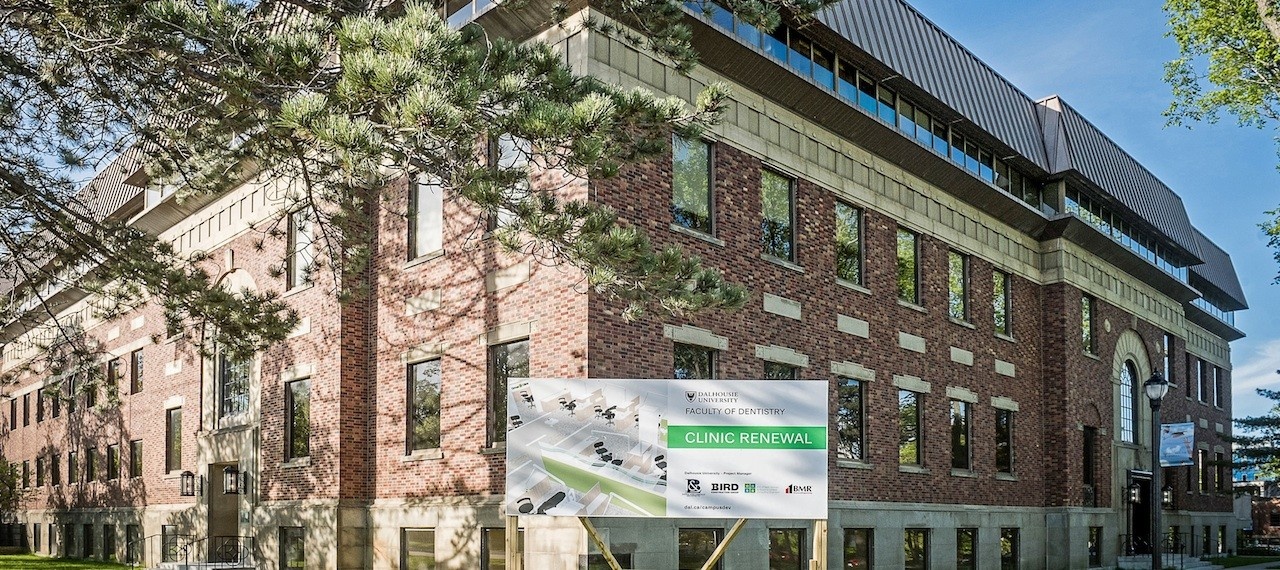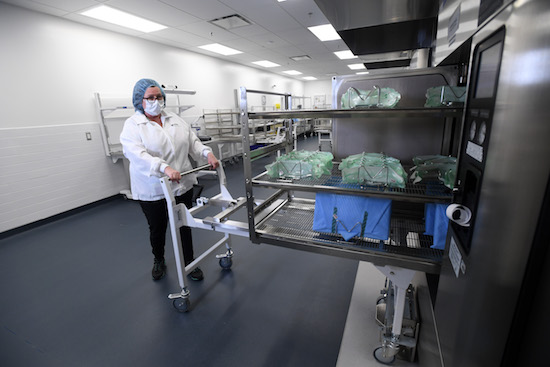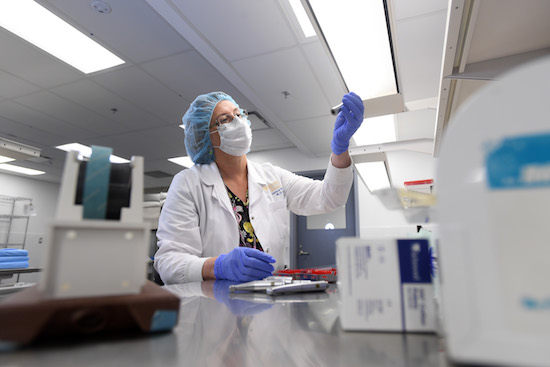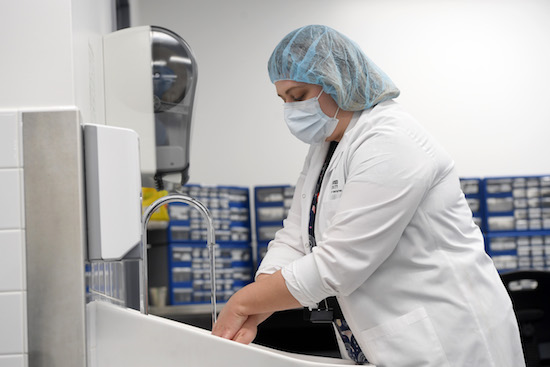News
» Go to news mainMDR: Stopping the chain of infection
MDR technician Cheryl Mullen wheels a cart full of sterilized instruments out of the sterilizer.Ěý Danny Abriel photos.
Ěý
Behind a set of locked metal doors, the Faculty of Dentistry’s medical device reprocessing (MDR) unit would not look out of place in a science fiction film. The overwhelming impression is of white and steel, apart from the neat stacks of blue sterilization wrap-covered packages of instruments. The walls are dotted with first-aid and eyewash stations and sharps disposal containers.
When the Faculty’s clinics are in full swing, the MDR team of 10 rotates through four shifts a day, 6:30 to 2:30, 7:00 am to 3:00 pm, 10:00 am to 6:00 pm, and 10:30 to 6:30. On Mondays there is a 1:00 pm to 9:00 pm shift to cover the weekly New Immigrant and Refugee Oral Health Clinic. Their task is to sterilize the thousands of dental instruments that are used in the dental school’s clinics each week.
The arrival of COVID-19 has added a new urgency to their work, but their central mission – even in pandemic-free times – is to stop the chain of infection.
“What we do is so obvious and yet it’s not,” says Cheryl Mullen, one of the MDR technicians on the team. “Without MDR, the whole system would collapse.”
“This is what we live for,” says Lisa Crotty, supervisor of the MDR team. “Making equipment safe for people to use is the main point of our profession.”
Janice McNamara inspects an instrument.
Changing with the times
When the chief medical officer for Nova Scotia closed down dental clinics at the end of March, the Faculty of Dentistry’s clinic reopened as one of just three emergency clinics in the province.
Working under new protocols, the oral healthcare providers in the clinic were instructed to behave as if every patient were infected with COVID-19. Likewise, in MDR, all staff were trained to assume that every instrument was contaminated with the virus.
“It’s at times like these that everyone can see the value in what we do,” says Crotty. “Even though we were well prepared for this moment, we had several meetings to address the question of how we could still function and keep everyone safe.”
While the clinic treated emergency patients each morning with a small team of faculty, residents, and volunteers, reserving the afternoons for cleaning and reviewing protocols, MDR operated with rotating teams of two, who went into the Faculty twice a week to process instruments. By working this way, staff numbers in the building were kept to a minimum.
Although standards are normally rigorous, MDR protocols were adjusted to bump up infection control measures even further. The MDR staff normally wear full PPE when they are dealing with soiled instruments, but for the emergency clinic they added higher level hospital-grade masks, goggles, upgraded surgical caps, and disposable plastic shields for use when hand-cleaning instruments. Instruments were hand-dried rather than blow-dried with clean compressed air to minimize the use of aerosols.
Every instrument has a name and is inspected prior to the sterilization process. The blue sterilization wrap is sealed with heat sensitive tape, so it is obvious when it has been processed in the sterilizer. Importantly, every tray of instruments has a stamp that indicates what sterilizer the tray went into, what sterilization cycle was used, and the date the tray was sterilized. “We can track anything,” says MDR technician Janice McNamara, which is important if the instruments need to be recalled for any reason.
The added precautions taken when the emergency clinic was the only clinicin the Faculty providing care may have increased the number of precautions taken in the MDR unit, but they also made the space eerily quiet. “This room is usually noisy with the sterilizers beeping and buzzing, the sound of equipment being washed, and the clinking of metal on metal,” says Crotty. “With only one sterilizer and one piece of washing equipment operating at a time, it felt like a very different place because it was so quiet.”
The upside of working under the strict protocols was the sense of connectedness among the group. Bi-weekly Zoom meetings helped to keep the group feel supported and that it was working as a unit, even though there was little in-person contact.
Crotty also says that the experience has had its rewards. “It’s at these times that we see the value in what we do. It brings us happiness to be part of the reason why the Faculty has the option to keep the clinic open. We’re very proud of that.”
Lisa Crotty washes her hands in preparation for work.
Getting back to “normal”
As restrictions on dental practices lifted and the Faculty of Dentistry gained university approval to bring back its students for the current academic year, the MDR unit has returned to a normal schedule, with all the beeping, buzzing, and other noises that it entails. The high level of PPE is here to stay for a while, however, as are the precautionary measures the team is taking to avoid creating aerosols.
“We’re excited to be back working together as a team,” says Crotty, “and we’re even pleased that the pandemic offered us an opportunity to re-evaluate and build on our existing safety protocols.”
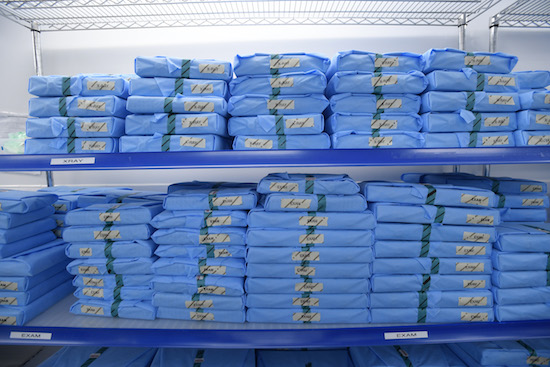
Ěý
Recent News
- Strategic Plan: 2021‑2026: Progress so far
- The 2025 Faculty of Dentistry Impact Award goes to Tarik Abdulkarim
- Dr. Leigha Rock takes on the presidency of the CADR
- Malek Mahmoud ‑ A vision and a plan
- The 2024 QEII Foundation Diversity in Health Care Bursaries: Feeling seen and included
- Celebrating African Heritage Month with an award
- New Bachelor of Dental Hygiene degree programs to start in 2025‑26
- Announcing a new path for licensure in Canada for internationally‑trained dentists
